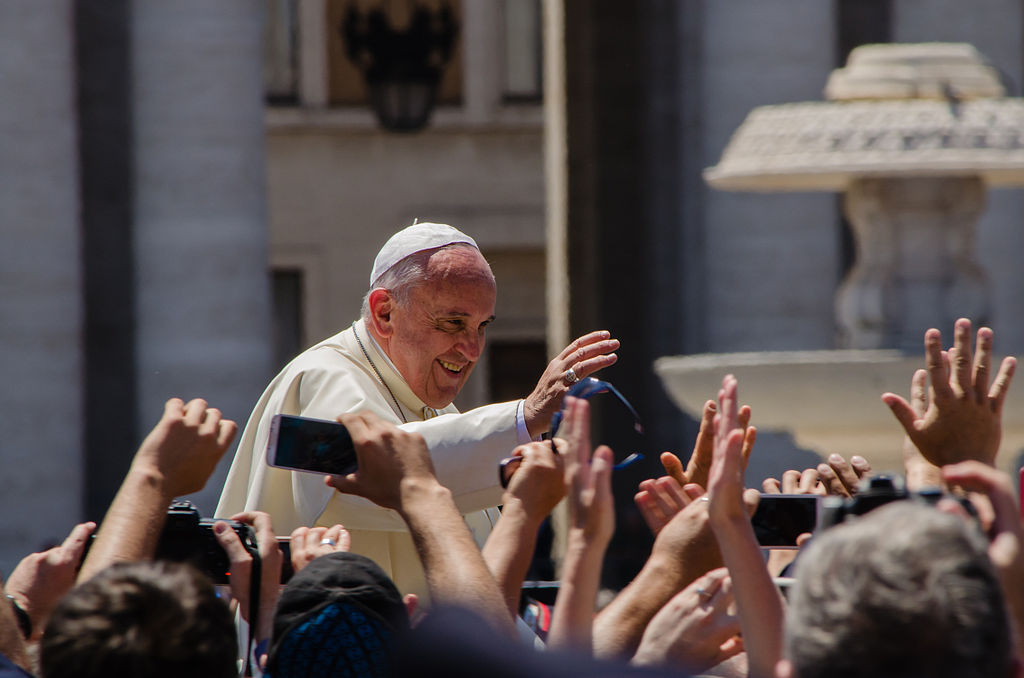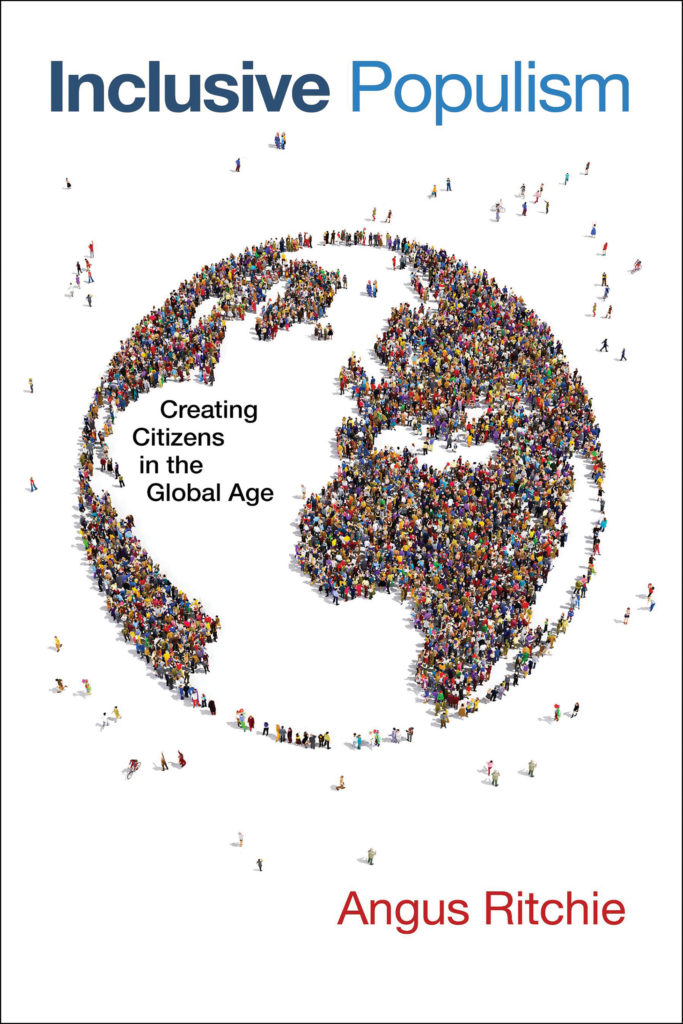
On April 15, 2021, over 1000 people gathered online from the US, UK, Germany, and Italy, to respond to Pope Francis’s call in Let Us Dream for the Church to “open its doors” to movements of “self-organized citizens.” Care workers, teaching assistants, and nurses engaged in dialogue with clergy, theologians, and community organizers. The gathering sought to embody the pope’s call for “a politics rooted in the people.”
This part of Let Us Dream‘s message has not received a great deal of attention. Indeed, as Austen Ivereigh (who collaborated with the pope on the book) explained to the conference, it is an aspect of Francis’s pontificate which has “largely flown under the radar.” Commentary on the book has tended to focus on particular policy pronouncements. Yet Francis is calling for a more radical reimagining of politics.
In Ivereigh’s words, Pope Francis conceives of politics as something “that is not just practiced when we vote as individuals in elections, but when we come together in and through our institutions to hold state and market to account, to build fraternity in civil society, and to give voice to ordinary people as they organize for change.” In Francis’s vision, this grassroots activity is not a peripheral or derivative form of political activity. It is the very essence of politics; in Let Us Dream he calls it “politics with a capital P” (112).
In 2012, when our research project began in East London, there was already significant anxiety in the United Kingdom and in the United States about popular disenchantment with elective politics, and about the erosion of the “intermediate institutions” which help ordinary citizens build a common life. In the intervening years, a divisive and exclusionary politics has sought to harness this disenchantment—and has further intensified the discrimination and stigmatization faced by ethnic minorities, migrants, and refugees.
The term “populism” is often used for this chauvinistic political movement. But there are other democratic and pluralistically oriented forms of populism. As Laura Grattan’s study of American populism shows, these other forms have brought diverse groups together and been a significant force for social change.
In Inclusive Populism—the fruit of our East London Contending Modernities research project —I argue that it is to such forms of populism that we must look for a way through our current democratic crisis.
Pope Francis sent a message to our April gathering, in which he discussed this conception of “inclusive populism.” He said,
I like to use the term ‘popularism’ to express the same idea. But what matters is not the name but the vision, which is the same: it is about finding the means to guarantee a life for all people that is worthy of being called human, a life capable of cultivating virtue and forging new bonds.
There are two key respects in which “inclusive populism” and “popularism” offer a vital alternative to divisive and nativist forms of populism.
 First of all, in Francis’s words, inclusive populism makes “the people . . . the protagonists.” By contrast, in divisive, nativist populisms, ordinary people take refuge in a “charismatic leader.” This distinction has parallels in Luke Bretherton’s contrast between “political” and “anti-political” populisms. In “anti-political” forms of populism, the “many” cede their power to a “one” who speaks and acts on their behalf. By contrast, political populism “embodies a conception of politics that works to reinstate plurality and inhibit totalizing monopolies (whether of the state or market) through common action and deliberation, premised on personal participation in and responsibility for tending public life” (52).
First of all, in Francis’s words, inclusive populism makes “the people . . . the protagonists.” By contrast, in divisive, nativist populisms, ordinary people take refuge in a “charismatic leader.” This distinction has parallels in Luke Bretherton’s contrast between “political” and “anti-political” populisms. In “anti-political” forms of populism, the “many” cede their power to a “one” who speaks and acts on their behalf. By contrast, political populism “embodies a conception of politics that works to reinstate plurality and inhibit totalizing monopolies (whether of the state or market) through common action and deliberation, premised on personal participation in and responsibility for tending public life” (52).
Secondly, “inclusive populism” is built around the diverse religious and civic institutions in which ordinary people gather to build a common life. Our study of community organizing in East London called into question the common assumption that religion is necessarily a force for social division—and contested the related idea that a society with citizens of different religious and metaphysical beliefs should conduct policy debates in terms which are neutral with respect to these beliefs.
Across almost a century of community organizing, both religious and secular organizers have found religious congregations to be the most resilient and powerful institutions on which to build what veteran organizer Ernesto Cortés Jr. (in an interview conducted for Inclusive Populism) calls “a graduate school to teach people how to participate in politics and shape their communities’ futures.” As Cortés explains, “Citizens are formed through the process of organizing. It requires institutions which can incubate this process by passing on the habits, practices, and norms necessary for humans with different opinions and temperaments to flourish together: to compromise, to talk to and not just about one another, to act in the light of one another’s views and needs and not just unilaterally or selfishly” (19).
In making the case for such an approach, Inclusive Populism argues that a secularizing liberalism—which fails to acknowledge its own contestable metaphysical assumptions—has contributed to our current climate of political alienation. This liberalism is epitomized by the political philosophies of John Rawls and Robert Nozick, whom for all their other differences share the assumption that there is a possibility of substantive reasoning about politics which is abstracted from our specific religious and metaphysical convictions (cf. Chapter 3 for a detailed discussion of these issues).
In place of secular liberalism’s false self-image of neutrality, a truly inclusive populism requires a “negotiated pluralism” in which citizens are encouraged to bring their religious and metaphysical convictions into the public square. Our research in East London shows how citizens in some of the poorest neighborhoods of England harnessed their religious convictions to work together to discern and promote a truly common good—and in particular how they move between different “registers” of discourse (which I term mutual witness, negotiation, and apologetics) that enable them to work together constructively across deep disagreement.
As Pope Francis told our April gathering,
In recognizing the importance of spirituality in the lives of the people, we regenerate politics. That is why it is essential that faith communities meet together and fraternize in order to work ‘for and with the people.’ With my brother the Grand Imam Ahmad Al-Tayyeb, ‘[we] declare the adoption of a culture of dialogue as the path; mutual cooperation as the code of conduct; reciprocal understanding as the method and standard.’

